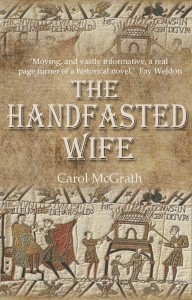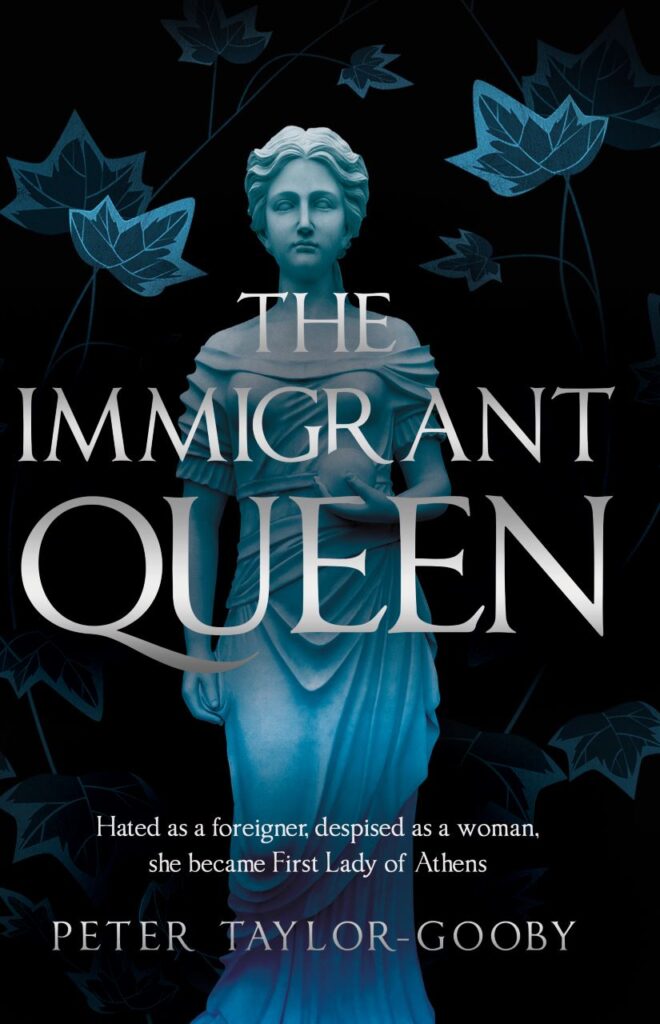The RONA shortlists: Carol McGrath on The Handfasted Wife
Richard Lee
 The Handfasted Wife is the story of the Norman Conquest and its immediate aftermath from the point of view of the royal women especially Edith Swan-Neck, whom I named Elditha in the novel as there were two important Ediths. She is set aside by Harold after Edward the Confessor dies in favour of a political marriage which would unite the south with the north in the face of foreign invasion. His handfasted marriage with Elditha was not recognised by the Church although it was a legal contract. Yet she had his six children all of whom are recorded in history and have interesting stories of their own. Her loyalty and love for Harold is suggested in history by the fact that she recognised his broken body on the battlefield of Hastings by marks only known to her. That intrigued me. Then she all but vanishes from the historical record. I give her a suggested story, the threat of remarriage to a Breton knight, and another potential love relationship though her romance with Harold haunts the novel as it haunted me its author. It is a story of adventure that involves journeying over the Irish Sea to seek help in the Viking world of Dublinia, to bring her children together and her involvement in the Siege of Exeter where her mother in law, Countess Gytha, held out against the Norman invaders.
The Handfasted Wife is the story of the Norman Conquest and its immediate aftermath from the point of view of the royal women especially Edith Swan-Neck, whom I named Elditha in the novel as there were two important Ediths. She is set aside by Harold after Edward the Confessor dies in favour of a political marriage which would unite the south with the north in the face of foreign invasion. His handfasted marriage with Elditha was not recognised by the Church although it was a legal contract. Yet she had his six children all of whom are recorded in history and have interesting stories of their own. Her loyalty and love for Harold is suggested in history by the fact that she recognised his broken body on the battlefield of Hastings by marks only known to her. That intrigued me. Then she all but vanishes from the historical record. I give her a suggested story, the threat of remarriage to a Breton knight, and another potential love relationship though her romance with Harold haunts the novel as it haunted me its author. It is a story of adventure that involves journeying over the Irish Sea to seek help in the Viking world of Dublinia, to bring her children together and her involvement in the Siege of Exeter where her mother in law, Countess Gytha, held out against the Norman invaders.
History and romance, or romance and history?
I saw this story primarily as one about relationships. However I am a thorough researcher and will not change known facts to suit a romance. It is both. My novel was inspired by the episode recorded in The Waltham Chronicle where Elditha recognises Harold’s body on the battlefield of Hastings. It opened questions that I wanted to pursue in fiction. This brought characters’ emotions to the fore at a time of Conquest. The historical novel was once called a romance interestingly! Romance in the past was constrained by arranged marriages and by the attitudes of the church towards women. Marriage was about begetting children and about property exchange. Yet, romance could and did evolve even within these constraints. The story of King Harold and Edith Swan-Neck is regarded as one of history’s great romance stories. I do believe you need to know the rules of an historical era before you, as a storyteller, break these and a romance does not have to own a conventional happy ever after ending. Situations involving war, conquest, a particular world turned on its head offers the opportunity to put romance in a situation out of a normal societal context. It is about living on the edge. Specific to this story I exploited this in The Handfasted Wife. Conquest allowed me to take my heroine out of context and present Elditha with a second romantic opportunity. I am a writer of fiction and a storyteller predominantly and an historian second particularly in the context of writing romance and the historical novel.
Which writers have most influenced your work?
I am influenced by a number of writers. I have always loved Katherine by Anya Seton. Ivanhoe and Waverley by Sir Walter Scott are fabulous historical novels. I think modern readers do like a sound historical background and true historical atmosphere, well developed historical characters not obviously anachronistic and they enjoy a well-written page-turning narrative with pace so that is what I aim to deliver. There are excellent writers around today. I would name Hilary Mantel without hesitation, Tracy Chevalier, Diana Gabaldon, Karen Maitland and Elizabeth Chadwick. These novelists incorporate research, recorded history and romance extremely well into their stories creating convincing historical worlds and believable characters. Importantly, they all write well, especially Mantel. The Handfasted Wife is first in a trilogy Daughters of Hastings. The Swan-Daughter is to be published this summer followed by The Betrothed Sister. I do hope to continue writing historical fiction but I may move forward in time. I have a yen for The High Middle Ages and for The English Civil War. I also like well-written time slip and may that way venture.
Catherine Earnshaw or Elizabeth Bennett? I love Wuthering Heights and particularly the passionate Cathy. Love stories do not always have happy endings.
Jamie Fraser or The Scarlet Pimpernel? I think Jamie wins and that may be because I have just discovered him and love his character. Thank you, Diana.
Call the Midwife or Downton Abbey I am not a great fan of either. I actually quite liked The White Queen!!!
Share a panel with Lucy Worsley or Bettany Hughes? Lucy I think. She seems fun underneath her prim, debutante exterior.
Movie or Theatre? Both.
Wolf Hall or The Other Boleyn Girl? Wolf Hall. I am afraid that I was not really convinced by the historical story in The Other Boleyn Girl.
Romanesque or High Medieval: Romanesque







